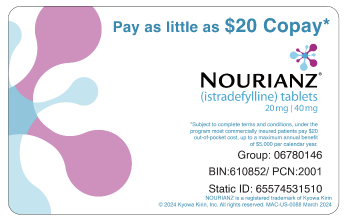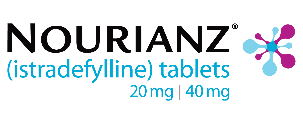Actor Portrayals.
GET HELP WITH ACCESS OPTIONS
Cost saving for eligible commercially insured NOURIANZ patients.
MAKE SURE YOUR PATIENT IS AWARE OF THE CO-PAY ASSISTANCE PROGRAM.

Eligible patients with commercial insurance may be able to fill their prescription for no more than $20 per month through the co-pay card program.
DownloadFrom co-pay assistance to financial assistance programs, Kyowa Kirin Cares has options that can help.
Commercial insurance

Kyowa Kirin offers co-pay assistance for eligible commercially insured patients. Review the co-pay assistance terms and conditions to determine if your patients with commercial insurance qualify.a,b
Government insurance

Kyowa Kirin does not offer a program for patients insured through government programs, such as Medicare, Medicaid, and TRICARE. Patients may be eligible for assistance through independent charitable foundations.
No insurance

Kyowa Kirin offers a patient assistance program for eligible uninsured patients. Download the application to review the terms and conditions and determine if your patients without insurance may qualify.
- a Patients must be US residents with an active primary commercial plan; patients with federal or state government insurance such as Medicare, Medicaid, and Tricare are not eligible for co-pay assistance. Other terms and conditions may apply.
- b Commercially insured patients do not need to participate in Kyowa Kirin Cares to be eligible for co-pay assistance.
Co-pay Card Program Terms and Conditions
The Kyowa Kirin Cares co-pay assistance program for NOURIANZ (the “Program”) helps commercially insured individuals who are permanent residents of the United States (including the US territories) and who are prescribed NOURIANZ for a use approved by the Food and Drug Administration (FDA) pay for their eligible out-of-pocket costs for the drug. Under the Program, eligible patients pay the first $20 of their applicable co-payment or cost-sharing for a 30-day supply of NOURIANZ, the first $40 of their applicable co-payment or cost-sharing for a 60-day supply of NOURIANZ, or the first $60 of their applicable co-payment or cost-sharing for 90-day supply of NOURIANZ and the Program pays the remainder of their co-payment or cost-sharing obligation for NOURIANZ up to $5000 per calendar year, i.e., January 1 through December 31. Each eligible patient is responsible for the first $20 of their out-of-pocket costs for a 30-day supply of NOURIANZ, the first $40 of their applicable co-payment or cost-sharing for a 60-day supply of NOURIANZ, or the first $60 of their applicable co-payment or cost-sharing for a 90-day supply of NOURIANZ per month and any amounts above the monthly and yearly maximums set forth above. Eligible patients must obtain a new Program card annually to continue enrollment in the Program.
The Program is limited to patients 18 years of age or older. The Program is NOT insurance.
Eligible individuals must have commercial insurance coverage for NOURIANZ. Uninsured and cash-paying individuals are NOT eligible for the Program, nor are individuals with commercial insurance coverage that does not provide coverage for NOURIANZ. Individuals with coverage for NOURIANZ, in whole or in part, under any state or federally funded healthcare program, including but not limited to, Medicare, Medicare Advantage Plans, Medicare Part D (including Qualified Retiree Prescription Drug Plans), Medicaid, Medigap, VA, DoD, TRICARE, and the Puerto Rico Government Health Insurance Plan, are NOT eligible for the Program. Patients who move from commercial to state or federally funded insurance will no longer be eligible for the Program.
Void if copied, transferred, purchased, altered, or traded, and where prohibited and restricted by law.
All coverage requirements of the eligible patient that are mandated by the insurance company must be satisfied for the Program to take effect. When submitting claims under the Program, patients are certifying that they understand the Program rules, regulations, and terms and conditions, and will comply with the Program terms as set forth herein. Additionally, you are certifying that a claim has not been submitted under a state or federally funded healthcare program, including but not limited to, Medicare, Medicare Advantage Plans, Medicare Part D (including Qualified Retiree Prescription Drug Plans), Medicaid, Medigap, VA, DoD, TRICARE, and the Puerto Rico Government Health Insurance Plan.
Kyowa Kirin reserves the right to make eligibility determinations, to set Program benefit maximums, to monitor participation, and to change, rescind, revoke, or discontinue the Program at any time without notice. Limit one Program enrollment per individual. If you have any questions regarding this Program, your eligibility, or benefits, or if you wish to discontinue your participation, call 833-KK-Cares Program Monday through Friday, 8 AM to 8 PM, Eastern Standard Time (ET).
Call 833-KK-CARES (833-552-2737)
Monday through Friday, 8 AM to 8 PM (ET)
FIND IMPORTANT FORMS AND RESOURCES
Access Kyowa Kirin Cares forms as well as useful NOURIANZ information and resources.
 Actor Portrayal.
Actor Portrayal.
Consumer brochure
Download the consumer brochure to help guide your patients through their NOURIANZ treatment.

Medical necessity letter
Download and use this template letter of medical necessity for appropriate patient cases.
 Actor Portrayal.
Actor Portrayal.
Appeal letter
Download and use this template letter of appeal for your patients who have been denied coverage.
 Actor Portrayal.
Actor Portrayal.
Patient assistance program
Download the patient assistance program application for your uninsured patients.
 Actor Portrayals.
Actor Portrayals.
About NOURIANZ
Visit the NOURIANZ website to learn about efficacy, safety, dosing, and more.
Indication
NOURIANZ® (istradefylline) is an adenosine receptor antagonist indicated as adjunctive treatment to levodopa/carbidopa in adult patients with Parkinson’s disease (PD) experiencing “off” episodes.
Important Safety Information
WARNINGS AND PRECAUTIONS:
Dyskinesia:
NOURIANZ in combination with levodopa may cause dyskinesia or exacerbate pre-existing dyskinesia. In clinical trials, 1% of patients treated with either NOURIANZ 20 mg or 40 mg discontinued treatment because of dyskinesia, compared to 0% for placebo.
Hallucinations / Psychotic Behavior:
Because of the potential risk of exacerbating psychosis, patients with a major psychotic disorder should not be treated with NOURIANZ. Consider dosage reduction or discontinuation if a patient develops hallucinations or psychotic behaviors while taking NOURIANZ.
Impulse Control / Compulsive Behaviors:
Patients treated with NOURIANZ and one or more medication(s) for the treatment of Parkinson’s disease (including levodopa) may experience intense urges to gamble, increased sexual urges, intense urges to spend money, binge or compulsive eating, and/or other intense urges, and the inability to control these urges. In clinical trials, 1 patient treated with NOURIANZ 40 mg was reported to have impulse control disorder, compared to no patient on NOURIANZ 20 mg or placebo.
DRUG INTERACTIONS:
The maximum recommended dosage in patients taking strong CYP3A4 inhibitors is 20 mg once daily. Avoid use of NOURIANZ with strong CYP3A4 inducers.
SPECIFIC POPULATIONS:
Pregnancy:
Based on animal data, may cause fetal harm.
Hepatic impairment:
The maximum recommended dosage of NOURIANZ in patients with moderate hepatic impairment is 20 mg once daily. Avoid use in patients with severe hepatic impairment.
ADVERSE REACTIONS
The most common adverse reactions with an incidence ≥5% and occurring more frequently than with placebo were dyskinesia (15%, 17%, and 8%), dizziness (3%, 6%, and 4%), constipation (5%, 6%, and 3%), nausea (4%, 6%, and 5%), hallucination (2%, 6%, and 3%), and insomnia (1%, 6%, and 4%) for NOURIANZ 20 mg, 40 mg, and placebo, respectively.
You are encouraged to report suspected adverse reactions to Kyowa Kirin, Inc. at 1-844-768-3544 or FDA at 1-800-FDA-1088 or www.fda.gov/medwatch.


